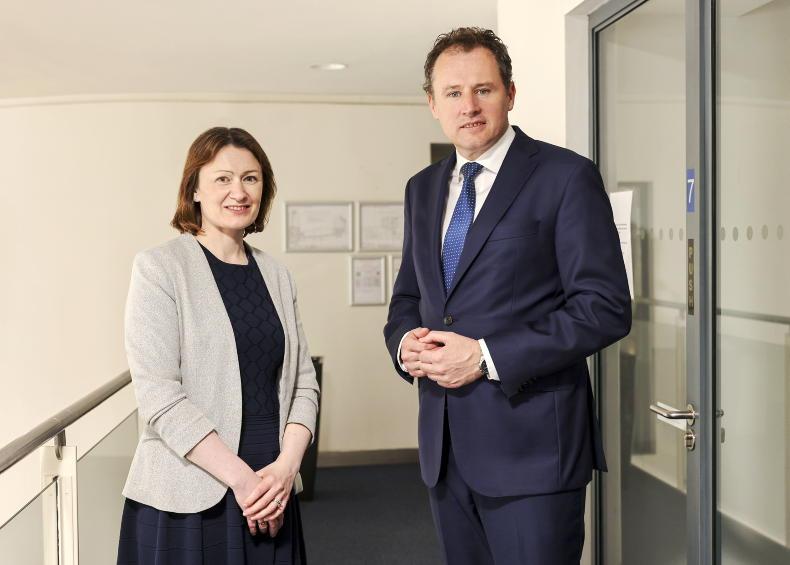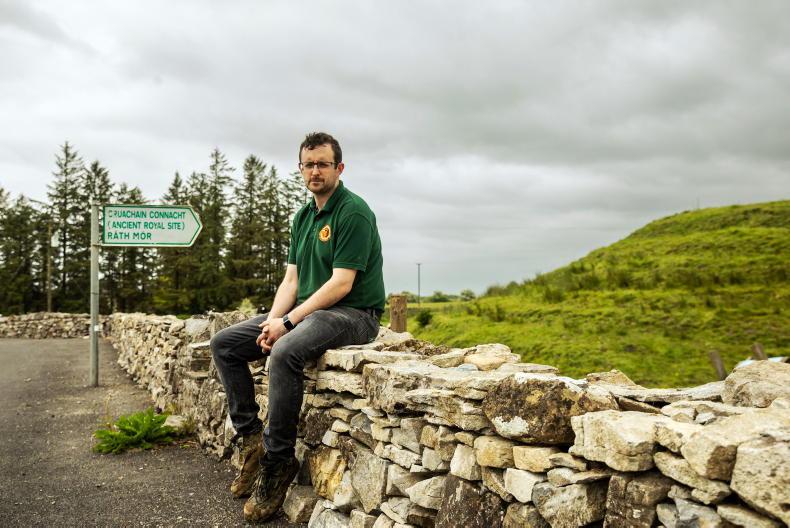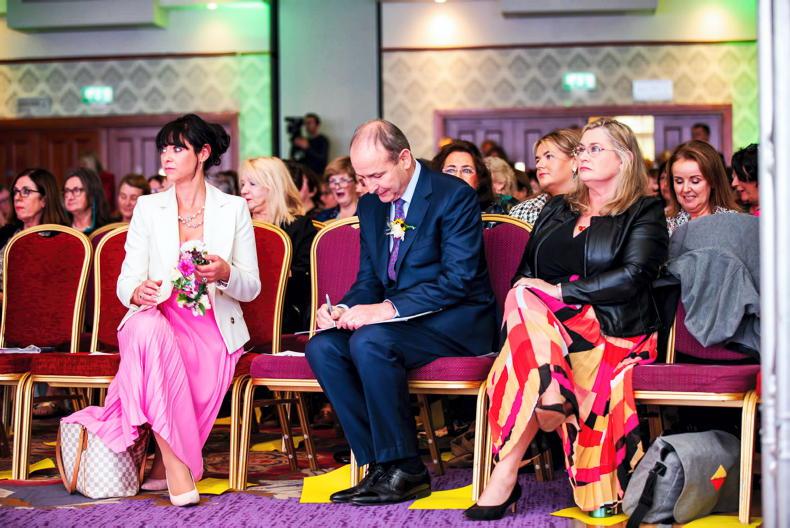“Up where they walk, up where they run, up where they stay all day in the sun, wanderin’ free, wish I could be, part of that world.”
Do you remember the movie? If not, you can catch up as a live-action remake of Disney’s 1989 animated classic The Little Mermaid has hit cinemas. In truth (or at least in my opinion), this movie epitomised the law of unintended consequences – that actions or decisions can have unforeseen outcomes.

Minister for Agriculture, Food and the Marine Charlie McConalogue T.D and CEO-designate for An Rialálaí Agraibhia (The Agri-Food Regulator), Niamh Lenehan.
There are three types: 1) direct consequences different to what was intended – Ariel not being recognised by Prince Eric; 2) indirect consequences opposite to what was intended – Eric falling in love with Ursula, the sea witch; and 3) unanticipated consequences that were not foreseen – Ariel’s father being turned into a sea worm.
While in the cartoon world, a happy ending is expected, a positive outcome is often not the case in the real world. Policy change can often lead to unintended consequences, both positive and negative. A CEO-designate – Niamh Lenehan – has been appointed to An Rialálaí Agraibhia (The Agri-Food Regulator). This office will have powers to increase transparency in the food chain and levy fines on those who engage in unfair trade with farmers and other suppliers.
A decade ago, I studied the impact of retailer dominance for my Nuffield Scholarship. At the time, below-cost selling and the rescinding of the Groceries Order were topical. The order was introduced in 1956 to curb the power of suppliers, but by 1972 power had shifted to retailers with below-cost selling a growing issue. A ban on the practice was introduced in 1987, but rebates and other discounts were not taken into account. Research suggests the unintended consequence was that the legislation inflated prices for consumers while failing to protect vulnerable suppliers and primary producers, whose goods were not covered.
Waste
Discounting infuriates producers, but perishable food products are discounted to reduce waste and – with 8-10% of greenhouse gas emissions associated with food waste – any increase would be a negative unintended consequence. It is positive to have a body to regulate with an eye to all consequences, but we must be careful what we wish for. Technology can be a solution.
Trinity College startup Senoptica Technologies has developed a packaging sensor that indicates the condition of food in fresh packs, so good food is not thrown away. Innovation can also be an unintended consequence of policy.

Daniel Curley.
Walking through the Farming Rathcroghan European Innovation Partnership (EIP) with Daniel Curley, he spoke of innovations developed to support their project goals.
The unintended but positive outcome is that these will be used in similar EU landscapes, protecting both farmers’ livelihoods and archaeology. Minister for Land Use and Biodiversity, Pippa Hackett this week launched a public consultation seeking themes for EIP-Agri projects under the new CAP, which is worth contributing to.
Katherine
Recycling letters – some dating back to when I started working in the Irish Farmers Journal – I found one from Katherine O’Leary, offering me support in my new role.

Katherine O Leary with then Taoiseach Micheal Martin and Amii McKeever at the 2022 Women and Agriculture Conference
Her support never ceased. As you may have read in her column last week, Katherine is going through treatment currently. To our longest-standing team member, I extend on behalf of our readers and all in the IFJ, our whole-hearted, never-ceasing support. A consequence, perhaps not intended, but fully merited for the support shown to thousands of our readers over 20 years.
Read more
Tracing the path of the Great Hunger in Strokestown
Editorial: our historic and tragic past is unfortunately someone else’s present
“Up where they walk, up where they run, up where they stay all day in the sun, wanderin’ free, wish I could be, part of that world.”
Do you remember the movie? If not, you can catch up as a live-action remake of Disney’s 1989 animated classic The Little Mermaid has hit cinemas. In truth (or at least in my opinion), this movie epitomised the law of unintended consequences – that actions or decisions can have unforeseen outcomes.

Minister for Agriculture, Food and the Marine Charlie McConalogue T.D and CEO-designate for An Rialálaí Agraibhia (The Agri-Food Regulator), Niamh Lenehan.
There are three types: 1) direct consequences different to what was intended – Ariel not being recognised by Prince Eric; 2) indirect consequences opposite to what was intended – Eric falling in love with Ursula, the sea witch; and 3) unanticipated consequences that were not foreseen – Ariel’s father being turned into a sea worm.
While in the cartoon world, a happy ending is expected, a positive outcome is often not the case in the real world. Policy change can often lead to unintended consequences, both positive and negative. A CEO-designate – Niamh Lenehan – has been appointed to An Rialálaí Agraibhia (The Agri-Food Regulator). This office will have powers to increase transparency in the food chain and levy fines on those who engage in unfair trade with farmers and other suppliers.
A decade ago, I studied the impact of retailer dominance for my Nuffield Scholarship. At the time, below-cost selling and the rescinding of the Groceries Order were topical. The order was introduced in 1956 to curb the power of suppliers, but by 1972 power had shifted to retailers with below-cost selling a growing issue. A ban on the practice was introduced in 1987, but rebates and other discounts were not taken into account. Research suggests the unintended consequence was that the legislation inflated prices for consumers while failing to protect vulnerable suppliers and primary producers, whose goods were not covered.
Waste
Discounting infuriates producers, but perishable food products are discounted to reduce waste and – with 8-10% of greenhouse gas emissions associated with food waste – any increase would be a negative unintended consequence. It is positive to have a body to regulate with an eye to all consequences, but we must be careful what we wish for. Technology can be a solution.
Trinity College startup Senoptica Technologies has developed a packaging sensor that indicates the condition of food in fresh packs, so good food is not thrown away. Innovation can also be an unintended consequence of policy.

Daniel Curley.
Walking through the Farming Rathcroghan European Innovation Partnership (EIP) with Daniel Curley, he spoke of innovations developed to support their project goals.
The unintended but positive outcome is that these will be used in similar EU landscapes, protecting both farmers’ livelihoods and archaeology. Minister for Land Use and Biodiversity, Pippa Hackett this week launched a public consultation seeking themes for EIP-Agri projects under the new CAP, which is worth contributing to.
Katherine
Recycling letters – some dating back to when I started working in the Irish Farmers Journal – I found one from Katherine O’Leary, offering me support in my new role.

Katherine O Leary with then Taoiseach Micheal Martin and Amii McKeever at the 2022 Women and Agriculture Conference
Her support never ceased. As you may have read in her column last week, Katherine is going through treatment currently. To our longest-standing team member, I extend on behalf of our readers and all in the IFJ, our whole-hearted, never-ceasing support. A consequence, perhaps not intended, but fully merited for the support shown to thousands of our readers over 20 years.
Read more
Tracing the path of the Great Hunger in Strokestown
Editorial: our historic and tragic past is unfortunately someone else’s present









 This is a subscriber-only article
This is a subscriber-only article










SHARING OPTIONS: